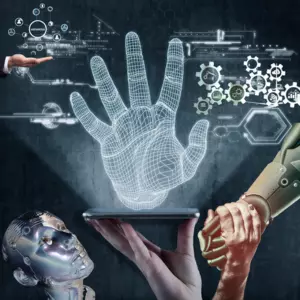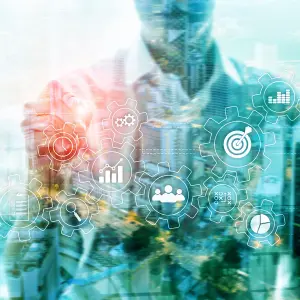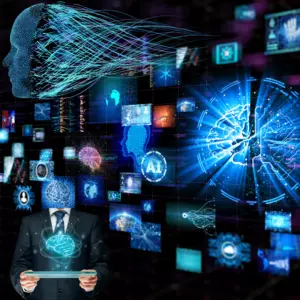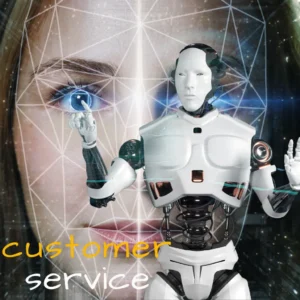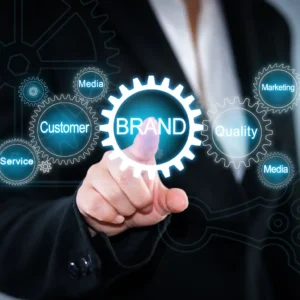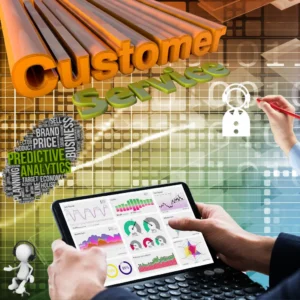
Revolutionizing Journeys
Unveiling the Power of AI Tools in Travel & Hospitality
Integrating Artificial Intelligence (AI) tools in the Travel and Hospitality industry marks a paradigm shift, revolutionizing how organizations engage with customers, streamline operations, and navigate challenges.
AI tools in the Travel and Hospitality domain are catalysts for innovation, spanning diverse segments such as Customer Experience & Engagement, Operations & Efficiency, Marketing & Sales, Safety & Security, Data Analytics & Insights, Sustainability & Environmental Impact, Emerging Technologies, Regulatory Compliance & Risk Management, Collaboration & Communication, and Accessibility & Inclusivity.
This discussion explores the intricate landscape of these tools, dissecting the business knowledge, software expertise, hardware requirements, training necessities, integration intricacies, and cost-benefit analyses that collectively shape the transformative impact of AI in reshaping the future of travel and hospitality.
50 AI tool ideas for the Travel and Hospitality industry
Customer Experience & Engagement:
- Personalized Recommendation Engine: Enhance customer satisfaction by providing customized recommendations for destinations, accommodations, and activities based on preferences and behaviour.
- Chatbots for Booking Assistance: Improve customer service by implementing chatbots for instant booking assistance, itinerary customization, and FAQs.
- Voice-Activated Room Service: Streamline customer experience by enabling voice commands for room service requests, information inquiries, and local recommendations.
- Sentiment Analysis for Reviews: Improve your understanding of customer feedback by analyzing sentiment to detect positive and negative sentiments within reviews.
- AI-powered Virtual Concierge: Enhance guest experience by providing a virtual concierge to assist with recommendations, reservations, and local insights.
Operations & Efficiency:
- Dynamic Pricing Optimization: Optimize pricing strategies in real-time based on demand, seasonal trends, and competitor pricing to maximize revenue.
- Predictive Maintenance for Facilities: Reduce downtime and maintenance costs by proactively predicting equipment failures and scheduling maintenance.
- AI-driven Inventory Management: Optimize inventory levels by predicting demand, reducing waste, and ensuring efficient supply chain management.
- Automated Fraud Detection: Enhance security and prevent fraudulent activities such as booking scams and identity theft through automated detection.
- Energy Consumption Optimization: Minimize energy costs by predicting peak usage times, optimizing HVAC systems, and implementing energy-efficient practices.
Marketing & Sales:
- AI-powered Content Creation: Generate engaging and personalized content for marketing materials, social media, and promotional campaigns.
- Customer Segmentation and Targeting: Boost your marketing ROI by creating personalized offers for specific customer segments.
- Social Media Listening: Monitor social media for customer feedback, trends, and sentiment to adapt real-time marketing strategies.
- Predictive Sales Analytics: Forecast future sales trends, identify potential leads, and optimize sales strategies for better conversion rates.
- Ad Campaign Optimization: Increase the efficiency of advertising campaigns by optimizing targeting, bidding strategies, and ad creatives.
Safety & Security:
- AI-driven Surveillance Systems: Enhance security with intelligent surveillance systems to identify suspicious activities and alert security personnel.
- Health and Safety Compliance Monitoring: Ensure compliance with health and safety regulations by using AI to monitor and enforce safety protocols.
- Biometric Authentication for Access Control: Improve security measures by implementing biometric authentication to access restricted areas and guestrooms.
- Automated Emergency Response Planning: Enhance safety by predicting potential emergency scenarios and automating response plans.
- Identity Verification for Booking: Reduce fraud and enhance guest security by implementing AI-driven identity verification during booking.
Data Analytics & Insights:
- Predictive Analytics for Demand Forecasting: Improve resource allocation and planning by predicting future room, service, and facility demand.
- Customer Journey Analytics: Understand the customer journey better, from initial booking to post-stay feedback, to optimize service touchpoints.
- AI-powered Competitive Analysis: Stay ahead in the market by leveraging AI to analyze competitors’ strategies, pricing, and customer reviews.
- Real-time Operational Dashboards: Provide management with real-time insights into operational metrics, allowing quick decision-making.
- Speech Analytics for Customer Service Calls: Analyze customer service calls to identify trends, joint issues, and areas for improvement in service delivery.
Sustainability & Environmental Impact:
- Carbon Footprint Measurement: Assess and reduce the environmental impact by measuring and optimizing the carbon footprint of travel and hospitality operations.
- Waste Management Optimization: Reduce waste and operational costs by predicting waste generation patterns and optimizing recycling efforts.
- Green Energy Integration: AI can optimize the integration of renewable energy sources.
- Optimized Transportation Routing: Minimize transportation-related emissions by optimizing routes, modes of transport, and fuel efficiency.
- Water Conservation Strategies: Conserve water resources using AI to predict consumption patterns, identify leaks, and optimize water usage.
Emerging Technologies:
- Augmented Reality (AR) Tour Guides: Enhance guest experiences with AI-powered AR tour guides that provide interactive information about landmarks and attractions.
- Blockchain-based Secure Booking Platform: Ensure secure and transparent transactions in bookings and reservations, reducing the risk of fraud.
- Drone-based Surveillance for Large Properties: Improve security and monitoring of large properties by deploying drones with AI capabilities for surveillance.
- Robotics for Room Service and Cleaning: Increase efficiency and reduce labour costs by implementing robots for room service delivery and cleaning tasks.
- IoT-enabled Smart Room Controls: Enhance guest comfort and energy efficiency by integrating AI-powered controls for lighting, temperature, and entertainment systems.
Regulatory Compliance & Risk Management:
- GDPR Compliance for Guest Data: Ensure compliance with data protection regulations by using AI to securely monitor and manage guest data.
- Automated Regulatory Reporting: Streamline compliance with regulations by automating the generation of reports required for regulatory bodies.
- Crisis Management Simulation: Prepare staff for crises using AI-driven simulations to train and evaluate emergency response procedures.
- Dynamic Risk Assessment: Mitigate risks by utilizing AI to dynamically assess potential risks related to events, weather, or other external factors.
- Employee Compliance Training: Improve employee compliance using AI for personalized and interactive compliance training programs.
Collaboration & Communication:
- Language Translation for Multilingual Support: Enhance communication with international guests by providing real-time language translation services.
- Collaborative Trip Planning Platforms: Facilitate group trip planning by using AI to suggest activities, accommodations, and itineraries that suit the preferences of all members.
- AI-driven Meeting Room Scheduling: Optimize meeting room usage by implementing AI-driven scheduling that considers past usage patterns and availability.
- Smart Notifications and Alerts: Improve communication with guests and staff by sending personalized and timely notifications based on preferences and context.
- Virtual Collaboration Spaces: Facilitate remote collaboration by creating AI-powered virtual spaces for team meetings, conferences, and events.
Accessibility & Inclusivity:
- AI-driven Accessibility Assistance: Improve accessibility for guests with support needs by providing AI-driven assistance for navigation, communication, and personalized services.
- Inclusive Design Recommendations: Enhance inclusivity by using AI to provide design recommendations that cater to diverse guest needs and preferences.
- Real-time Translation for Sign Language: Improve communication for guests with hearing impairments by offering real-time translation for sign language.
- AI-guided Wayfinding for Complex Facilities: Assist guests in navigating complex facilities with AI-guided wayfinding systems, considering accessibility requirements.
- Personalized Accessibility Profiles: Enhance guest experiences by creating personalized accessibility profiles that adapt services and facilities based on individual needs.
AI Tools for Customer Experience and Engagement
Business Knowledge Requirements:
Building AI tools for Customer Experience & Engagement in the Travel and Hospitality industry requires a deep understanding of customer behaviour, preferences, and the intricacies of the travel sector. Knowledge of hospitality service standards, destination trends, and the impact of personalized experiences on customer satisfaction is crucial.
Software Knowledge:
- Machine Learning for Personalized Recommendations: Proficiency in machine learning algorithms is required to analyze customer data. This analysis will help in generating personalized recommendations for customers.
- Natural Language Processing (NLP) for Chatbots: Expertise in NLP to develop chatbots capable of understanding and responding to natural language queries.
- Speech Recognition for Voice-Activated Services: Knowledge of speech recognition software for implementing voice-activated services seamlessly.
- NLP for Sentiment Analysis: Competence in NLP for sentiment analysis to extract insights from customer reviews.
- NLP and Machine Learning for Virtual Concierge: Integration of NLP and machine learning to enable a virtual concierge that evolves based on user interactions.
Hardware Requirements:
- Computational Power: Adequate computing resources to support machine learning algorithms for real-time personalized recommendations.
- Speech Recognition Infrastructure: Hardware can handle speech recognition processes for voice-activated services.
Training Required:
- Data Scientists: Training on developing and fine-tuning machine learning models for personalized recommendations.
- NLP Specialists: Training in NLP techniques for chatbot development and sentiment analysis.
- IT Support: Familiarity with maintaining and troubleshooting hardware and software components of the AI tools.
Integrations:
- Customer Databases: Integration with customer databases to access historical data and enhance personalization.
- Booking Systems: Seamless integration with booking systems to facilitate instant reservations through chatbots.
- Review Platforms: Integration with review platforms to gather and analyze customer sentiments.
Comparative Tools:
- Chatbot Platforms (e.g., Dialogflow, Microsoft Bot Framework): Existing platforms with NLP capabilities for building chatbots.
Recommendation:
Integrate proven solutions like IBM Watson for Hospitality and popular chatbot platforms. This approach ensures quicker deployment, industry expertise, and cost-effectiveness compared to building from scratch.
Cost/Benefits Analysis:
- Costs:
- Integration Costs: Investment in integrating with existing platforms.
- Training Costs: Staff training on utilizing and maintaining integrated tools.
- Benefits:
- Quick Deployment: Faster implementation with established solutions.
- Industry Expertise: Leveraging tools with domain-specific capabilities.
- Cost-Efficiency: Potentially lower costs compared to developing from scratch.
- Scalability: Established solutions offer scalability as per business growth.
- Risk Mitigation: Lower risks associated with technical challenges than building a tool from scratch.

5 AI Tools for Customer Experience and Engagement in Hospitality
The discussion delves into crafting AI tools for Customer Experience & Engagement in the Travel and hospitality domain, covering business and software knowledge, hardware, training, integrations, and comparative tools. Recommendations emphasize customization. The cost/benefits analysis highlights efficiency and enhanced customer satisfaction as pivotal factors in strategically adopting these tools.
AI Tools for Operations and Efficiency
Business Knowledge Requirements:
Building AI tools for Operations & Efficiency in the Travel and Hospitality industry demands a profound understanding of the operational intricacies, cost structures, and revenue streams specific to this sector. In-depth knowledge of supply chain dynamics, pricing strategies, facility maintenance protocols, and fraud prevention measures is essential.
Software Knowledge:
- Machine Learning for Dynamic Pricing: Proficiency in machine learning algorithms to analyze demand patterns, competitor pricing, and seasonal trends for dynamic pricing optimization.
- Predictive Analytics for Maintenance: Expertise in predictive analytics to develop models that foresee equipment failures, allowing for proactive maintenance planning.
- Machine Learning for Inventory Management: Competence in machine learning algorithms to predict demand, optimize inventory levels, and streamline supply chain processes.
- Machine Learning and Pattern Recognition for Fraud Detection: Building robust automated fraud detection systems requires knowledge of machine learning and pattern recognition techniques.
- Predictive Analytics for Energy Consumption Optimization: Skills in predictive analytics to forecast peak usage times, optimize HVAC systems, and implement energy-efficient practices.
Hardware Requirements:
- Computational Power: Adequate computing resources to support complex algorithms for dynamic pricing, predictive maintenance, inventory optimization, and fraud detection.
- Energy-efficient Infrastructure: Hardware capable of supporting energy-efficient systems for minimizing energy costs.
Training Required:
- Data Scientists: Training on developing and fine-tuning machine learning models for pricing optimization, predictive maintenance, inventory management, and fraud detection.
- Maintenance and Operations Staff: Familiarity with AI tools for maintenance scheduling, inventory optimization, and operational efficiency.
- Security Personnel: Training on monitoring and responding to alerts generated by the automated fraud detection system.
Integrations:
- Supply Chain Management Systems: Integration with existing supply chain management systems for seamless execution of AI-driven inventory management.
- Booking and Payment Systems: Integration with booking and payment systems for real-time pricing adjustments and fraud detection.
- Facility Management Systems: Integration with facility management systems to streamline maintenance workflows.
Comparative Tools:
- Infor Dynamic Enterprise Performance Management (EPM): Offers AI-driven solutions for pricing optimization and operational efficiency.
- Splunk for Predictive Analytics: Utilizes machine learning for predictive analytics and anomaly detection, applicable in fraud detection.
Recommendation:
Considering the complexity of Operations & Efficiency tools, a combination of buying and customizing existing tools like Infor Dynamic EPM and Splunk is recommended. This approach ensures industry-specific expertise, faster deployment, and potential cost savings.
Cost/Benefits Analysis:
- Costs:
- Licensing Costs: Investment in acquiring licenses for existing tools.
- Customization Costs: Expenses related to tailoring the tools to specific business needs.
- Training Costs: Training staff on using and interpreting insights from AI tools.
- Benefits:
- Industry Expertise: Leveraging tools with domain-specific capabilities.
- Quick Deployment: Faster implementation compared to building from scratch.
- Cost-Efficiency: Lower costs than developing entirely new solutions.
- Operational Optimization: Improved pricing, maintenance, inventory management, and fraud detection lead to cost savings and revenue maximization.
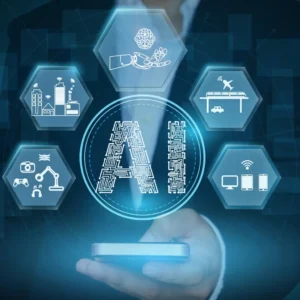
5 AI Tools for Operations and Efficiency in Hospitality
Discover the potential of AI tools to optimize operations and efficiency in Travel and Hospitality. From dynamic pricing optimization to predictive maintenance, inventory management, fraud detection, and energy consumption optimization, these tools empower businesses to enhance operational excellence, minimize costs, and ensure customer satisfaction in this dynamic industry.
AI Tools for Marketing and Sales
Business Knowledge Requirements:
Developing AI tools for Marketing & Sales in the Travel and Hospitality industry necessitates a profound understanding of marketing strategies, customer behaviour, and industry-specific sales dynamics. Knowledge of effective content creation, customer segmentation, social media trends, sales forecasting, and advertising optimization is crucial.
Software Knowledge:
- Natural Language Processing (NLP) and Machine Learning for Content Creation: Proficiency in NLP and machine learning algorithms to generate engaging and personalized content for diverse marketing channels.
- Machine Learning for Customer Segmentation: Competence in machine learning algorithms to analyze customer data and segment audiences for targeted marketing.
- NLP for Social Media Listening: Expertise in NLP for monitoring social media platforms, extracting customer feedback, and analyzing sentiment in real-time.
- Predictive Analytics for Sales: Skills in predictive analytics to forecast sales trends, identify potential leads, and optimize sales strategies.
- Machine Learning for Ad Campaign Optimization: Knowledge of machine learning algorithms to optimize advertising campaigns through improved targeting, bidding, and creative strategies.
Hardware Requirements:
- Computational Power: Adequate computing resources to support complex algorithms for content creation, customer segmentation, predictive analytics, and ad campaign optimization.
Training Required:
- Marketing Teams: Training on AI tools for content creation, customer segmentation, social media listening, predictive sales analytics, and ad campaign optimization.
- Data Analysts: Understanding the interpretation of insights generated by AI tools for informed decision-making in marketing and sales strategies.
Integrations:
- Customer Relationship Management (CRM) Systems: Access customer data seamlessly via CRM integration for targeted marketing.
- Social Media Platforms: Integration for real-time monitoring, feedback extraction, and sentiment analysis.
- Ad Campaign Platforms: Integration with ad campaign platforms to implement optimized strategies directly.
Comparative Tools:
- HubSpot Marketing Hub: Offers AI-powered features for content creation, customer segmentation, and marketing automation.
- Salesforce Einstein Analytics: Provides predictive analytics capabilities for sales forecasting and optimization.
Recommendation:
Considering the complexity and specific expertise required, buying and customizing existing tools like HubSpot Marketing Hub or Salesforce Einstein Analytics is recommended. This approach ensures quicker deployment, alignment with industry standards, and potential cost savings.
Cost/Benefits Analysis:
- Costs:
- Licensing Costs: Investment in acquiring licenses for existing tools.
- Customization Costs: Expenses related to tailoring the tools to specific business needs.
- Training Costs: Training marketing teams and data analysts on using and interpreting insights from AI tools.
- Benefits:
- Quick Deployment: Faster implementation compared to building from scratch.
- Industry Expertise: Leveraging tools with domain-specific capabilities.
- Cost-Efficiency: Lower costs than developing entirely new solutions.
- Improved Marketing ROI: Optimization of content, customer targeting, and advertising, leading to increased marketing ROI.
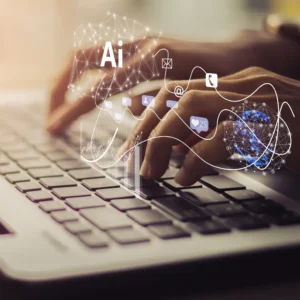
5 AI tools for Marketing and Sales in Hospitality and Travel
The discussion on AI tools for Marketing and Sales in the Travel and Hospitality domain emphasizes the vital fusion of industry-specific knowledge and advanced technologies. The analysis recommends using existing tools for efficient deployment and customization to align with the sector’s unique demands.
AI Tools for Safety and Security
Business Knowledge Requirements:
To build AI tools for Safety & Security in the Travel and Hospitality industry, a deep understanding of safety regulations, security protocols, and potential threats is crucial. Knowledge of health and safety compliance, emergency response planning, and identity verification processes is essential.
Software Knowledge:
- Computer Vision for Surveillance Systems: Expertise in computer vision algorithms to develop intelligent surveillance systems capable of identifying suspicious activities.
- Computer Vision and Machine Learning for Health and Safety Monitoring: Proficiency in computer vision and machine learning for monitoring health and safety compliance through real-time analysis.
- Biometrics for Authentication: Knowledge of biometric authentication techniques for secure access control and guest identity verification.
- Machine Learning and Predictive Analytics for Emergency Response: Skills in machine learning and predictive analytics for automating emergency response planning based on potential scenarios.
Hardware Requirements:
- High-quality Cameras and Sensors: Deployment of high-quality cameras and sensors for effective surveillance and data collection.
- Biometric Scanners: Installation of biometric scanners for secure access control and guest identity verification.
Training Required:
- Security Personnel: Training on monitoring and responding to alerts generated by AI-driven surveillance systems.
- Staff: Familiarity with using AI tools for health and safety compliance monitoring and emergency response.
Integrations:
- Security Systems: Integration with existing security systems for a unified approach to surveillance and alert mechanisms.
- Access Control Systems: Access control system Integration for seamless implementation of biometric authentication.
- Emergency Response Systems: Integration with emergency response systems to automate responses based on AI predictions.
Comparative Tools:
- Avigilon Control Center (ACC): Offers AI-driven video analytics for intelligent surveillance.
- AlertEnterprise: Provides a platform for identity verification, access control, and compliance monitoring.
Recommendation:
Considering the critical nature of Safety & Security tools, buying and customizing existing tools like Avigilon Control Center or AlertEnterprise is recommended. This approach ensures quicker deployment, alignment with industry standards, and potential cost savings compared to building from scratch.
Cost/Benefits Analysis:
- Costs:
- Licensing Costs: Investment in acquiring licenses for existing tools.
- Customization Costs: Expenses related to tailoring the tools to specific business needs.
- Hardware Costs: Investment in high-quality cameras, sensors, and biometric scanners.
- Training Costs: Training security personnel and staff on using and interpreting insights from AI tools.
- Benefits:
- Quick Deployment: Faster implementation compared to building from scratch.
- Industry Expertise: Leveraging tools with domain-specific capabilities.
- Cost-Efficiency: Lower costs than developing entirely new solutions.
- Enhanced Security: Improved surveillance, compliance monitoring, and identity verification, leading to enhanced safety and security.
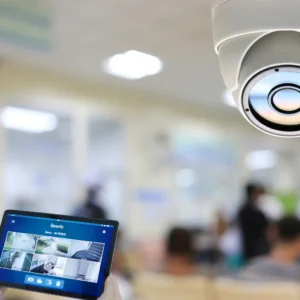
5 AI Tools for Safety and Security in Hospitality and Travel
The discussion on AI tools for Safety and Security in the Travel and Hospitality Domain explores the integration of advanced technologies to fortify safety protocols. From biometric authentication and surveillance systems to automated emergency response planning, the discourse emphasizes crucial business knowledge, software development, hardware requirements, and strategic considerations for effective implementation.
AI Tools for Data Analytics and Insights
Business Knowledge Requirements:
Developing AI tools for Data Analytics & Insights in the Travel and Hospitality industry demands a thorough understanding of industry-specific metrics, customer behaviour, competitive landscape, and operational challenges. Knowledge of demand forecasting, customer journey mapping, competitive analysis, operational dynamics, and customer service nuances is crucial.
Software Knowledge:
- Predictive Analytics for Demand Forecasting: Proficiency in predictive analytics algorithms to analyze historical data and forecast future demand patterns for rooms, services, and facilities.
- Machine Learning for Customer Journey Analytics: Machine learning algorithms analyze and optimize the customer journey, from booking to post-stay feedback.
- Machine Learning for Competitive Analysis: Skills in machine learning for analyzing competitors’ strategies, pricing models, and customer sentiments from reviews.
- Data Visualization for Operational Dashboards: Expertise in data visualization tools to create real-time operational dashboards for management insights.
- Natural Language Processing (NLP) for Speech Analytics: Knowledge of NLP techniques to analyze and derive insights from customer service calls.
Hardware Requirements:
- Computational Power: Adequate computing resources to support complex algorithms for predictive analytics, machine learning, and data visualization.
Training Required:
- Data Analysts/Scientists: Training using AI tools for predictive analytics, machine learning, and data visualization.
- Operational Staff: Familiarity with interpreting insights from operational dashboards for effective decision-making.
- Customer Service Representatives: Training on utilizing insights from speech analytics for improved service delivery.
Integrations:
- Data Sources (Booking Platforms, CRM, Competitor Data): Integration with various data sources such as booking platforms, CRM systems, and competitor data for comprehensive analytics.
- Operational Systems: Integration with operational systems to ensure real-time data updates for operational dashboards.
- Customer Service Call Records: Integration with call recording systems for speech analytics.
Comparative Tools:
- IBM Cognos Analytics: Offers a comprehensive suite of data analytics, including predictive analytics and data visualization.
- Tableau: A widely used data visualization tool for creating interactive and shareable dashboards.
Recommendation:
Considering the complexity and variety of analytics involved, buying and customizing existing tools like IBM Cognos Analytics or Tableau is recommended. This approach ensures quicker deployment, industry expertise, and potential cost savings compared to building from scratch.
Cost/Benefits Analysis:
- Costs:
- Licensing Costs: Investment in acquiring licenses for existing tools.
- Customization Costs: Expenses related to tailoring the tools to specific business needs.
- Training Costs: Training staff on using and interpreting insights from AI tools.
- Benefits:
- Quick Deployment: Faster implementation compared to building from scratch.
- Industry Expertise: Leveraging tools with domain-specific capabilities.
- Cost-Efficiency: Lower costs than developing entirely new solutions.
- Improved Decision-Making: Enhanced insights into demand, customer journeys, competitive strategies, and operational metrics leading to improved decision-making.
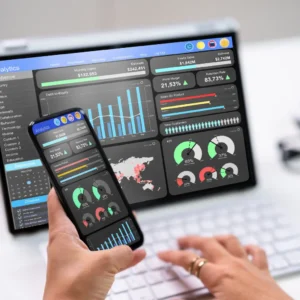
5 AI tools for Data Analytics and Insights in Hospitality
The discussion on AI tools for Data Analytics and Insights in the Travel and Hospitality domain explores the intricate blend of business expertise and technological prowess required for tools like predictive analytics, customer journey analytics, competitive analysis, real-time dashboards, and speech analytics. It advocates for a strategic approach, leaning towards customized solutions for industry-specific needs, ultimately propelling the sector forward.
AI Tools for Sustainability and Environmental Impact
Business Knowledge Requirements:
Developing AI tools for Sustainability & Environmental Impact in the Travel and Hospitality industry requires a deep understanding of environmental sustainability, carbon footprint metrics, waste management practices, renewable energy integration, transportation logistics, and water conservation strategies specific to the industry.
Software Knowledge:
- Predictive Analytics for Carbon Footprint Measurement and Waste Management: Proficiency in predictive analytics algorithms to measure and optimize carbon footprint and waste generation patterns.
- Machine Learning for Optimized Transportation Routing: Competence in machine learning algorithms to optimize transportation routes, modes, and fuel efficiency.
- Predictive Analytics for Water Conservation Strategies: Skills in predictive analytics to forecast water consumption patterns, identify leaks, and optimize water usage.
- Integration of Green Energy Sources: Knowledge of AI-driven solutions to integrate renewable energy into hospitality operations.
Hardware Requirements:
- Computational Power: Adequate computing resources to support complex predictive analytics and machine learning algorithms for sustainability optimization.
Training Required:
- Environmental Analysts: Training on AI tools for measuring and optimizing carbon footprint, waste management, transportation routing, and water conservation.
- Operations Staff: Familiarity with interpreting insights from sustainability tools for implementing optimized practices.
Integrations:
- Operational Systems (Transportation, Energy Management, Water Systems): Integration with various operational systems to gather real-time data for sustainability analytics.
- Renewable Energy Infrastructure: Integration with renewable energy infrastructure for seamless optimization of green energy integration.
- Waste Management Systems: Integration with waste management systems for real-time tracking and optimization.
Comparative Tools:
- Ecolife Recycling Management Software: Offers waste management optimization solutions for businesses.
- Carbon Analytics: Provides carbon footprint measurement and reduction solutions.
Recommendation:
Given the specialized nature of sustainability tools, a combination of buying and customizing existing tools like Ecolife Recycling Management Software or Carbon Analytics is recommended. This approach ensures quicker deployment, alignment with industry standards, and potential cost savings compared to building from scratch.
Cost/Benefits Analysis:
- Costs:
- Licensing Costs: Investment in acquiring licenses for existing tools.
- Customization Costs: Expenses related to tailoring the tools to specific business needs.
- Training Costs: Training environmental analysts and operations staff on using and interpreting insights from AI tools.
- Benefits:
- Quick Deployment: Faster implementation compared to building from scratch.
- Industry Expertise: Leveraging tools with domain-specific capabilities.
- Cost-Efficiency: Lower costs than developing entirely new solutions.
- Environmental Impact: Significant reduction in carbon footprint, waste generation, and optimized use of renewable energy and water resources leading to long-term sustainability benefits.

5 AI Tools for Sustainability and Environmental Impact
Explore the transformative role of AI tools for Sustainability and Environmental Impact in the Travel and Hospitality domain. From predicting carbon footprints to optimizing waste management, energy integration, transportation routing, and water conservation, these tools usher in a sustainable era for the industry, balancing technological innovation with ecological responsibility.
AI Tools for Emerging Technologies
Business Knowledge Requirements:
Building AI tools for Emerging Technologies in the Travel and Hospitality industry requires a deep understanding of guest experiences, security protocols, property management, and operational efficiency. Knowledge of augmented reality applications, blockchain for secure transactions, drone-based surveillance, robotics, and IoT in hospitality operations is crucial.
Software Knowledge:
- Augmented Reality Development: Proficiency in augmented reality development tools to create interactive and informative AR tour guides.
- Blockchain Development: Skills in blockchain development for creating a secure and transparent booking platform.
- Computer Vision for Drone-based Surveillance: Expertise in computer vision algorithms for enabling drones with AI capabilities for surveillance.
- Robotics and Machine Learning for Room Service: Knowledge of robotics and machine learning for developing AI-powered robots for room service and cleaning tasks.
- IoT Integration for Smart Room Controls: Competence in integrating IoT devices with AI for smart room controls.
Hardware Requirements:
- AR-compatible Devices: Compatibility with AR devices for delivering augmented reality experiences.
- Blockchain Network Infrastructure: Deployment of a secure and scalable blockchain network for transactions.
- Drones with AI Capabilities: Acquisition of drones equipped with AI capabilities for surveillance.
- Robotics Hardware: Deployment of robots equipped with AI capabilities for room service and cleaning.
- IoT Devices: Installation of IoT devices for intelligent room controls.
Training Required:
Training staff on operating and managing emerging technologies such as AR devices, blockchain platforms, drones, robotics, and IoT devices.
Integrations:
- Booking Systems: Integration with existing booking systems for seamless and secure transactions.
- Property Management Systems: Efficient coordination of robotics and IoT controls can be achieved through integration with property management systems.
- Security Systems: Integration with security systems for monitoring and alert mechanisms.
Comparative Tools:
- Microsoft HoloLens (AR): A popular AR device for interactive experiences.
- IBM Food Trust (Blockchain): Utilized in the food industry, it showcases the potential of blockchain for secure transactions.
- AeroVironment (Drone Solutions): Offers drone solutions for various industries, including surveillance.
- SoftBank Robotics (Robotics): Provides humanoid robots for various service applications.
- Google Nest (IoT): Offers smart home products for IoT-enabled controls.
Recommendation:
Given the specialized nature of emerging technologies, a combination of buying and customizing existing tools like Microsoft HoloLens, IBM Food Trust, AeroVironment, SoftBank Robotics, and Google Nest is recommended. This approach ensures quicker deployment, alignment with industry standards, and potential cost savings compared to building from scratch.
Cost/Benefits Analysis:
- Costs:
- Licensing Costs: Investment in acquiring licenses for existing tools.
- Hardware Costs: Acquisition of AR devices, blockchain network infrastructure, drones, robotics, and IoT devices.
- Customization Costs: Expenses related to tailoring the tools to specific business needs.
- Training Costs: Training staff on operating and managing emerging technologies.
- Benefits:
- Quick Deployment: Faster implementation compared to building from scratch.
- Industry Expertise: Leveraging tools with domain-specific capabilities.
- Cost-Efficiency: Lower costs than developing entirely new solutions.
- Enhanced Experiences: Improved guest experiences through AR tour guides, secure transactions with blockchain, efficient surveillance with drones, and robotic services.

5 AI tools for Emerging Technologies in Travel and Hospitality
The discussion delves into the strategic implementation of AI tools for Emerging Technologies in the Travel and Hospitality domain. Exploring specific tools like AR Tour Guides, Blockchain-based Booking, Drone Surveillance, Robotics, and IoT-enabled Controls, it analyzes the requisite knowledge, software, hardware, training, integrations, and market comparisons, presenting a comprehensive overview for industry-wide innovation.
AI Tools for Regulatory Compliance and Risk Management
Business Knowledge Requirements:
Developing AI tools for Regulatory Compliance and Risk Management in the travel and hospitality industry requires a profound understanding of data protection regulations like GDPR, crisis management, regulatory reporting requirements, and employee compliance training. Understanding industry-specific risks and compliance nuances is crucial.
Software Knowledge:
- Compliance Monitoring Algorithms: Proficiency in compliance monitoring algorithms for ensuring GDPR compliance in handling guest data securely.
- Natural Language Processing (NLP) for Automated Reporting and Employee Training: Skills in NLP for automating regulatory reporting processes and developing interactive compliance training programs.
- Simulation Software for Crisis Management: Expertise in simulation software for creating AI-driven crisis management simulations.
- Predictive Analytics for Dynamic Risk Assessment: Knowledge of predictive analytics algorithms for dynamically assessing and mitigating risks.
Hardware Requirements:
- Computational Power: Adequate computing resources to support complex algorithms for compliance monitoring, NLP, simulations, and predictive analytics.
Training Required:
- Compliance Officers: Training on utilizing AI tools for compliance monitoring and reporting.
- Crisis Management Teams: Training on conducting and participating in AI-driven crisis management simulations.
- Employee Training Facilitators: Training on implementing and overseeing AI-driven employee compliance training programs.
Integrations:
- Guest Data Systems: Integration with guest data systems for monitoring and ensuring GDPR compliance.
- Regulatory Reporting Platforms: Integration with regulatory reporting platforms for seamless and automated reporting.
- HR Systems: Integration with HR systems for tracking employee compliance training progress.
Comparative Tools:
- OneTrust: Offers a comprehensive platform for privacy management and GDPR compliance.
- Resolver: Provides risk management software with crisis management capabilities.
- SAP Litmos: A learning management system that can be used for employee compliance training.
Recommendation:
Given regulatory compliance and risk management’s critical nature, buying and customizing tools like OneTrust, Resolver, and SAP Litmos is recommended. This approach ensures quicker deployment, alignment with industry standards, and potential cost savings compared to building from scratch.
Cost/Benefits Analysis:
- Costs:
- Licensing Costs: Investment in acquiring licenses for existing tools.
- Customization Costs: Expenses related to tailoring the tools to specific business needs.
- Training Costs: Training compliance officers, crisis management teams, and employee training facilitators using AI tools.
- Benefits:
- Quick Deployment: Faster implementation compared to building from scratch.
- Industry Expertise: Leveraging tools with domain-specific capabilities.
- Cost-Efficiency: Lower costs than developing entirely new solutions.
- Enhanced Compliance: Improved GDPR compliance, streamlined regulatory reporting, crisis management preparedness, and personalized employee training, leading to reduced risks and better regulatory adherence.

5 AI Tools for Regulatory Compliance and Risk Management
The discussion on AI tools for Regulatory Compliance and Risk Management in the Travel and Hospitality domain explores the necessity and benefits of leveraging artificial intelligence. From GDPR compliance monitoring to crisis management simulations, the integration of AI proves crucial for enhancing efficiency, accuracy, and industry-specific relevance in navigating the complex landscape of the sector.
AI Tools for Collaboration and Communication
Business Knowledge Requirements:
Developing AI tools for Collaboration & Communication in the Travel and Hospitality industry requires a deep understanding of guest communication dynamics, group trip planning nuances, meeting room utilization patterns, and integrating language translation services for multilingual support.
Software Knowledge:
- Natural Language Processing (NLP) for Language Translation: Proficiency in NLP algorithms for providing real-time language translation services to enhance international guest communication.
- Machine Learning for Collaborative Trip Planning and Meeting Room Scheduling: Skills in machine learning algorithms for suggesting personalized trip itineraries and optimizing meeting room schedules.
- Machine Learning for Smart Notifications: Competence in machine learning for sending timely and personalized notifications to guests and staff.
- Virtual Reality Development for Collaboration Spaces: Knowledge of virtual reality development for creating AI-powered virtual collaboration spaces.
Hardware Requirements:
- Computational Power: Adequate computing resources to support complex algorithms for NLP, machine learning, and virtual reality.
Training Required:
- Staff (Front Desk, Guest Services, Event Planners): Training on using AI tools for language translation, collaborative trip planning, meeting room scheduling, and managing virtual collaboration spaces.
Integrations:
- Booking Platforms and CRM: Integration with booking platforms and CRM systems for personalized guest communication.
- Meeting Room Management Systems: Integration with meeting room management systems for AI-driven scheduling.
- Notification Systems: Integration with notification systems for sending personalized alerts and updates.
Comparative Tools:
- Smartling (Language Translation): Provides language translation services for businesses.
- TripIt (Trip Planning): A popular trip planning platform that can serve as a reference for AI-driven trip planning features.
- Microsoft Bookings (Meeting Room Scheduling): Offers meeting room scheduling capabilities.
- Slack (Notifications and Collaboration): Widely used for team communication and notifications.
- Spatial (Virtual Collaboration): A virtual collaboration platform that utilizes augmented reality.
Recommendation:
Considering the diversity of functionalities, a combination of buying and customizing existing tools like Smartling, TripIt, Microsoft Bookings, Slack, and Spatial is recommended. This approach ensures quicker deployment, alignment with industry standards, and potential cost savings compared to building from scratch.
Cost/Benefits Analysis:
- Costs:
- Licensing Costs: Investment in acquiring licenses for existing tools.
- Customization Costs: Expenses related to tailoring the tools to specific business needs.
- Training Costs: Training staff using AI tools for communication, collaboration, and guest services.
- Benefits:
- Quick Deployment: Faster implementation compared to building from scratch.
- Industry Expertise: Leveraging tools with domain-specific capabilities.
- Cost-Efficiency: Lower costs than developing entirely new solutions.
- Improved Communication: Enhanced guest and staff communication through language translation, collaborative trip planning, intelligent notifications, and virtual collaboration spaces, improving customer experience.

5 AI Tools for Collaboration and Communication in Hospitality
The discussion on AI tools for Collaboration and Communication in the Travel and Hospitality domain explores the strategic development of personalized accessibility profiles, language translation services, collaborative trip planning platforms, AI-driven meeting room scheduling, intelligent notifications, and virtual collaboration spaces.
AI Tools for Accessibility and Inclusivity
Business Knowledge Requirements:
Developing AI tools for Accessibility & Inclusivity in the Travel and Hospitality industry requires a profound understanding of accessibility standards, diverse guest needs, and inclusive design principles. It is essential to understand the difficulties that people with different disabilities encounter.
Software Knowledge:
- Computer Vision and NLP for Accessibility Assistance: Proficiency in computer vision and NLP algorithms to provide AI-driven assistance for navigation, communication, and personalized services for guests with support needs.
- Machine Learning for Inclusive Design Recommendations: Skills in machine learning algorithms to offer design recommendations that cater to diverse guest needs and preferences.
- NLP for Real-time Translation of Sign Language: Expertise in NLP for developing real-time translation systems to assist guests with hearing impairments.
- Computer Vision for AI-guided Wayfinding: Knowledge of computer vision algorithms for developing AI-guided wayfinding systems, considering accessibility requirements.
- Machine Learning for Personalized Accessibility Profiles: Competence in machine learning to create personalized accessibility profiles that adapt services and facilities based on individual needs.
Hardware Requirements:
- Computational Power: Adequate computing resources to support complex algorithms for computer vision, NLP, and machine learning.
Training Required:
- Staff (Guest Services, Facility Managers): Training on using and understanding AI tools for providing accessibility assistance, implementing inclusive design, and utilizing personalized accessibility profiles.
Integrations:
- Guest Profile Systems: Integration with guest profile systems to access and update personalized accessibility profiles.
- Facility Management Systems: Integration with facility management systems for implementing AI-guided wayfinding and inclusive design recommendations.
- Communication Platforms: Integration with communication platforms for real-time translation of sign language.
Comparative Tools:
- Aira (Accessibility Assistance): Offers remote assistance for individuals with visual impairments.
- Iviva (Inclusive Design): Provides design recommendations for inclusive environments.
- Google’s Project Euphonia (Speech Recognition for Accessibility) Focuses on improving communication accessibility for individuals with speech impairments.
Recommendation:
Given the specialized nature of accessibility and inclusivity requirements, a combination of buying and customizing existing tools like Aira, Iviva, and Google’s Project Euphonia is recommended. This approach ensures quicker deployment, alignment with industry standards, and potential cost savings compared to building from scratch.
Cost/Benefits Analysis:
- Costs:
- Licensing Costs: Investment in acquiring licenses for existing tools.
- Customization Costs: Expenses related to tailoring the tools to specific business needs.
- Training Costs: Training staff on using AI tools for accessibility assistance, inclusive design, and personalized accessibility profiles.
- Benefits:
- Quick Deployment: Faster implementation compared to building from scratch.
- Industry Expertise: Leveraging tools with domain-specific capabilities.
- Cost-Efficiency: Lower costs than developing entirely new solutions.
- Enhanced Accessibility: Improved accessibility for guests with support needs through AI-driven assistance, inclusive design recommendations, real-time translation for sign language, AI-guided wayfinding, and personalized accessibility profiles.
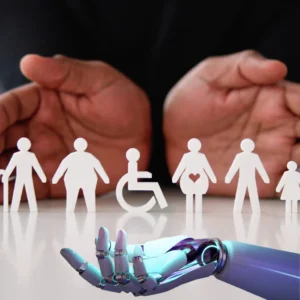
5 AI tools for Accessibility and Inclusivity in Hospitality
The discussion on AI tools for Accessibility and Inclusivity in the Travel and Hospitality Domain delves into the transformative impact of technologies like machine learning, computer vision, and natural language processing. From personalized accessibility profiles to real-time translation and wayfinding, these tools reshape the industry, offering tailored experiences for guests and fostering inclusivity.
Conclusion
In conclusion, the landscape of AI tools in the Travel and Hospitality industry is poised for transformation through diverse innovations. Spanning across Customer Experience & Engagement, Operations & Efficiency, Marketing & Sales, Safety & Security, Data Analytics & Insights, Sustainability & Environmental Impact, Emerging Technologies, Regulatory Compliance & Risk Management, Collaboration & Communication, and Accessibility & Inclusivity, these tools cater to the varied needs and challenges faced by organizations of all sizes in the sector.
The development of these tools demands a nuanced understanding of the industry’s intricacies, ranging from personalized guest experiences and operational efficiency to safety protocols and environmental sustainability. Leveraging AI in these domains requires a profound knowledge of specific business processes and a keen awareness of industry regulations, customer expectations, and emerging trends.
The decision to build, buy, or go hybrid depends on requirements, but quick deployment, cost-efficiency, and industry standards are everyday needs. By integrating with existing, proven tools in each domain, organizations can harness the expertise embedded in these solutions, ensuring a seamless transition into an AI-driven future for Travel and Hospitality. The anticipated benefits include enhanced customer satisfaction, optimized operations, improved safety measures, and a more sustainable and inclusive industry, all contributing to the overarching goal of redefining the travel experience through cutting-edge AI solutions.
Related Articles
- AI tools for Emerging Technologies in Travel and Hospitality
- AI tools for Data Analytics and Insights in Hospitality
- AI Tools for Customer Experience and Engagement in Hospitality
- AI Tools for Collaboration and Communication in Hospitality
- AI tools for Accessibility and Inclusivity in Hospitality
- AI tools for Marketing and Sales in Hospitality and Travel
- AI Tools for Operations and Efficiency in Hospitality
- AI Tools for Regulatory Compliance and Risk Management
- AI Tools for Safety and Security in Hospitality and Travel
- AI Tools for Sustainability and Environmental Impact





